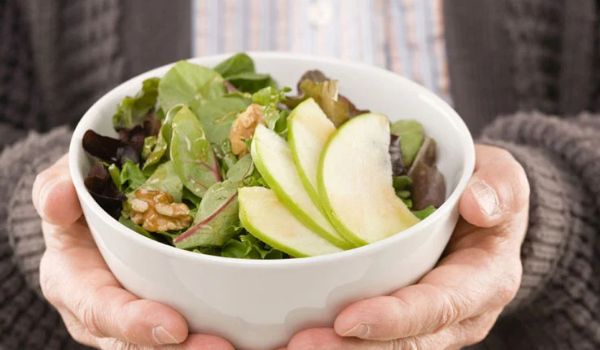When people talk about their diets, they’re often talking about changing their eating habits to lose weight, or to achieve some sort of athletic goal. However, your diet describes everything you eat, whether you’re following a diet plan or not. Lifestyle diets are everywhere nowadays, with your neighbors telling you about how their new diet changed their lives and interviews promoting one or another online and in the media. Which ones promote healthy lifestyles for seniors, and which ones should you steer clear of?
Remember to always consult your doctor or another healthcare professional who knows your health history before making significant changes to your diet or activity levels. They will always be your best resource for learning about how different choices will affect your body and interact with any existing conditions or current medications.
1. Mediterranean Diet
The Mediterranean diet consists of fruits, vegetables, whole grains, beans, nuts, legumes, and olive oil supplemented by dairy products, poultry, fish, eggs, and the occasional sweet treat and glass of wine. This diet is recommended by experts as a heart- and brain-healthy choice for seniors.
Pros:
The Mediterranean diet is proven to improve heart health, help people slim down, and lower risk of cancer and diabetes, but the most unique benefit for seniors is its ability to reduce the risk of developing dementias such as Alzheimer’s and vascular dementia. In one study, participants who adhered strictly to the diet saw as much as a 19% reduction in dementia risk, and even participants who rated their adherence to the diet as “moderate” retained more cognitive function than control participants.
Cons:
For people who are used to following a Western diet, eliminating or heavily restricting red meats, processed sugars, and saturated fats is a big change, and it can be hard to make the switch and curb cravings for old favorites. However, because you can still receive some of the benefits of the Mediterranean diet without following it strictly, you don’t have to feel bad about a few “cheat” meals and treats here and there.
2. Ketogenic Diet
The theory behind the ketogenic diet is that by limiting intake of carbohydrates, your body enters a metabolic state called ketosis, which burns energy from fats instead of carbs. This diet is currently very popular for losing weight, but its purported benefits for seniors are a topic of some controversy.
Pros:
The ketogenic diet has been proven to promote weight loss, increase HDL cholesterol levels, and decrease LDL cholesterol, which can all help reduce your risk of heart disease.
Cons:
At a maximum of about 20-50 g carbohydrates a day and an emphasis on proteins and saturated fats, the ketogenic diet is both very restrictive and very different from the average Western diet, which can make adherence difficult. In addition, experts assert that not enough evidence exists to back up the claim that the ketogenic diet is good for managing diabetes, and that the diet’s restriction of whole carbohydrates like fruits and grains fails to provide the balanced variety of nutrients necessary for seniors.
3. Vegetarian Diet
People who follow the many variations on plant-based diets do so for different reasons, including promoting general health, concern for animals, reducing environmental impact, and more. But while flexitarianism (limiting meat intake), pescetarianism (limiting meat intake to fish only), lacto-ovo vegetarianism (eliminating meat but still consuming dairy and eggs), and veganism (eliminating all animal products), are generally perceived as health-conscious diets, there are some drawbacks for seniors.
Pros:
Plant-based diets promote the consumption of whole fruits and vegetables, nuts, beans, legumes, whole grains, and other nutrient-rich and heart-healthy foods. In addition, eating whole foods can promote weight loss. Many people who choose a plant-based diet do it for religious or moral reasons, which promotes mental well-being.
Cons:
While seniors generally need fewer calories than they did when they were younger, experts recommend loading up on protein for long-lasting energy, a boosted immune system, and strong bones. Western diets rely heavily on meat and dairy to provide protein, and making the switch to plant proteins like beans, nuts, and soy is a difficult transition. In addition, cutting meat out of the equation limits intake of vitamin B12, a necessary vitamin for healthy immune systems.
4. Weight Watchers Diet
The Weight Watchers Diet is a commercial diet plan that promotes - you guessed it - weight loss in program participants. The program uses an easy-to-understand system for choosing meals and snacks that allow you to eat the foods you love while losing weight.
Pros:
The Weight Watchers Diet is effective at promoting weight loss, and has an extensive network of nutritional and lifestyle support via mentors, peers, and experts. The program can be tailored to address health concerns such as heart health, immune system health, and brain health in addition to losing weight, and the diet does not require a significant shift in foods that you have access to consuming.
Cons:
The support networks, program literature, and tracking and planning systems require monthly costs in addition to food purchases, which can be a difficult expense to justify for seniors with a relatively unchanging budget. Also, weight loss and the maintenance of a healthy weight is the primary goal of the Weight Watchers diet, with other health goals requiring extra education and work to pursue.
Whether or not a diet will help you achieve your health goals is heavily dependent upon your body and your lifestyle, but some of the lifestyle diets out there today are definitely better for seniors than others. Always talk with a trusted healthcare professional, such as your physician, nutritionists, or another specialist, before making significant changes in your diet. And if you decide to make a change, who knows? You might find yourself enjoying a healthier lifestyle and new foods, too.





